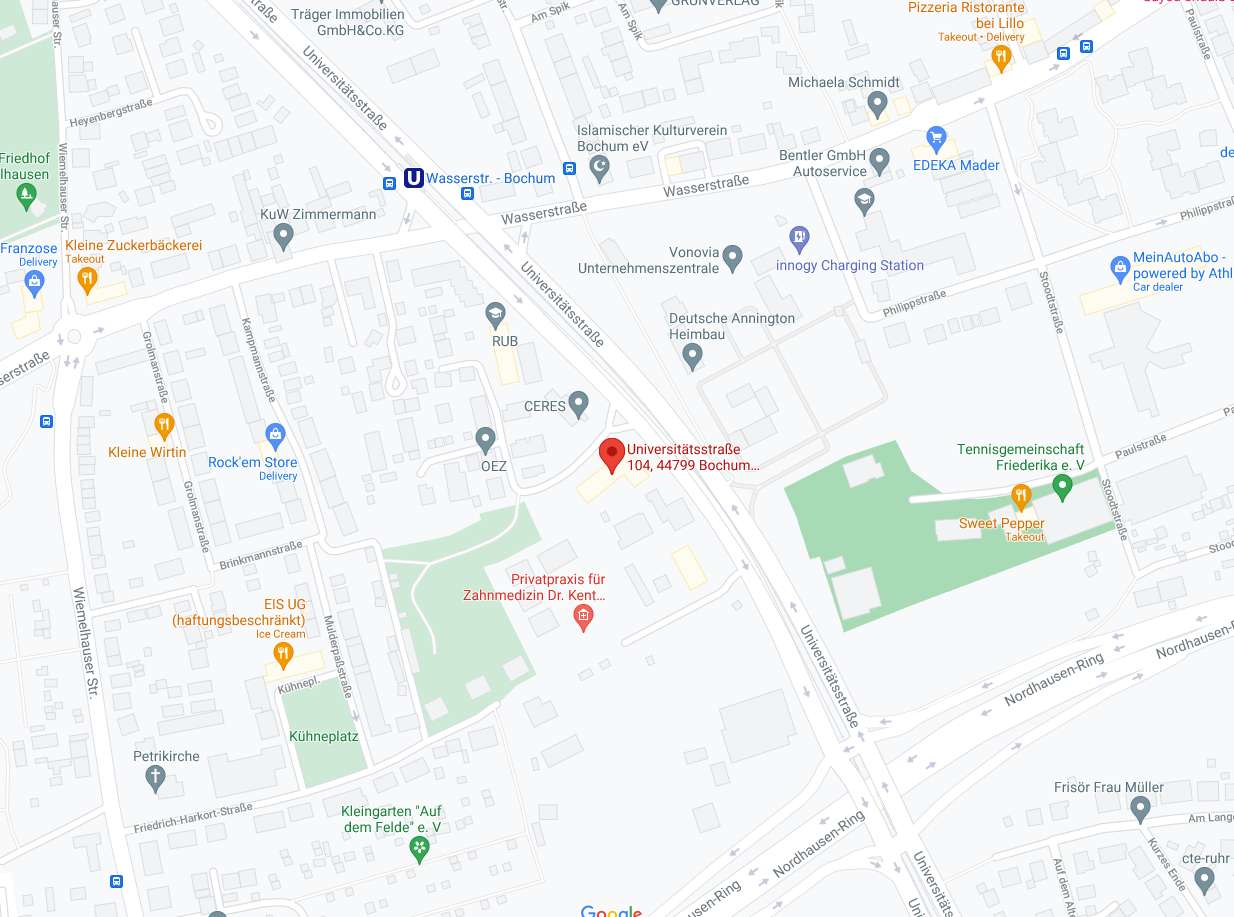1. Übersicht
1.1 Allgemeiner Gebrauch des bestimmten Artikel
- Wir verwenden den bestimmten Artikel the, wenn eine Person, ein Ding oder Begriff näher bestimmt werden soll (1).
- Ein Nomen steht ohne bestimmten Artikel, wenn es eine uneingeschränkte, allgemeine Bedeutung trägt (2).
Beispielsätze:
(1) The cat is sitting on the table.
(2) I don’t like cats.
1.2 Aussprache
- Vor Konsonanten wird das „e“ in the wie das „e“ in „habe“ kurz ausgesprochen.
Beispielsätze:
- The car is fast.
- The dog is almost ten years old.
- The kids are scarred of lightning.
- Vor Vokalen (a, e, i, o, u) wird das „e“ in the wie das „ie“ in „Dieb“ lang ausgesprochen. Ausschlaggebend ist, wie der Laut des Folgewortes gesprochen, nicht wie er geschrieben wird.
Beispielsätze:
- We live at the end of the road.
- We live in the old house near the supermarket.
- The hours at School go by very slowly.
2. Gebrauch bei Abstrakta, Stoff- und Gattungsnamen
- Abstrakte Nomen, Stoffnamen und Gattungsnamen im Plural benötigen den bestimmten Artikel, wenn sie näher bestimmt sind, z.B. durch of-Fügungen oder Relativsätze.
2.1 Abstrakta
|
Do you know where life came from? Time will show. She studies history at University. Drugs are a real danger to society. Is fashion that important? |
I don’t want the life of a film star. She remembers the time of her childhood. Today she learnt about the history of the Romans. This young man is an important member of the society of this country. She dislikes the fashion of today. |
2.2 Stoffnamen
| You need milk to make cheese. Is gold more worth than silver? |
We can’t use the milk anymore we bought yesterday. The gold of this ring doesn’t match the bracelet. |
2.3 Gattungsnamen im Plural
| Pupils like to go on field trips. Cows are very useful for our nutrition. |
The pupils of this school went on a field trip last week. The cows on that organic farm enjoy a very happy life. |
3. Gebrauch bei Eigennamen
- Es wird kein bestimmter Artikel bei Eigennamen (1), Verwandtschaftsbezeichnungen (2) und Eigennamen mit vorangestelltem Titel (3) verwendet. Wenn Eigennamen ein Adjektiv vorausgeht, wird ebenfalls kein bestimmter Artikel verwendet (4).
Beispielsätze:
- Bei Eigennamen, die im Plural stehen, wird immer der bestimmte Artikel verwendet.
Beispiel:
- The Millers and the Smiths are neighbours.
4. Gebrauch bei Gebäuden und Ortsangaben
- Es steht kein bestimmter Artikel bei den Nomen church, college, hospital, prison, school, university usw., wenn nicht an das Gebäude, sondern an den Zweck des Gebäudes gedacht wird.
- Wird nur an das Gebäude gedacht, steht das Nomen mit dem bestimmten Artikel.
| He doesn’t want to spend his life in prison.
Mr. Evans is in hospital. He had an accident last night. My grandma goes to church on Sundays. |
The prison in Kesington Road is too small. We’re going to the hospital to visit Mr. Evans. Where is Tom? – He forgot his bag and went back to the church. |
5. Gebrauch bei geographischen Bezeichnungen
- Die Verwendung des bestimmten Artikels bei geographischen Bezeichnungen ist von Fall zu Fall unterschiedlich. Ländernamen im Singular, einzelne Berge, Seen, Gebäude, Parks und Straßen tragen keinen Artikel.
- Ländernamen im Plural, Gebirge, Flüsse, Meere(steile) und Namen mit of-phrase werden mit bestimmtem Artikel verwendet.
|
OHNE Artikel |
MIT Artikel |
|
|
Länder Straßen, Plätze, Sehens würdigkeiten Gebirge, Berge, Gewässer |
Australia, England, Germany, Ireland, Mexico, Switzerland, Canada Broadway, Buckingham Palace, Heathrow Airport, Central Park, Manhattan, Oxford Street, Times Square, Tower Bridge Lake Constance, Lake Michigan, Loch Ness, Mount Everest, Mount McKinley |
the Bahamas, the Czech Republic, the Netherlands, the West Indies, the United States the British Museum, the Bronx, the Empire State Building, the Statue of Liberty, the White House, the Tower of London the Rocky Mountains, the Rhine, the Thames, the Indian (Pacific, Atlantic) Ocean, the Gulf of Mexico, the Baltic Sea |
6. Gebrauch bei Zeitangaben
- Werden Monate, Wochentage, Mahlzeiten oder Feiertage allgemein benutzt, stehen sie ohne Artikel. Ist ein ganz bestimmter Tag, Monat usw. gemeint, muss der bestimmte Artikel verwendet werden.
|
OHNE Artikel |
MIT Artikel |
|
on Monday, next Thursday, on Saturday afternoon in July, in April, in September at night, at noon, by day, by night after breakfast, before lunch, during dinner at Christmas, at Easter, at Whitsun/ Pentecost |
on the Monday before school starts
The June of 2011 was rainy. during the morning, in the afternoon, in the evening, throughout the night, during the day The dinner on your birthday was lovely. Some people find the Christmas Season rather depressing. |
7. Gebrauch nach “most“
- Steht most in der Bedeutung des Superlativs kann dieser mit oder ohne bestimmten Artikel stehen.
- Lincoln School has got (the) most pupils.
(Die Lincoln Schule hat die meisten Schüler.)
- Lincoln School has got (the) most pupils.
Beispiel:
- Bedeutet most aber „die Mehrheit, der größere Teil“, dann steht es immer ohne Artikel.
Beispiel:
8. Gebrauch nach “all”, “both”, “half”, “double”, “twice”
- Nach all, both, half, double, twice steht der bestimmte Artikel.
Beispielsätze:
| all the time | die ganze Zeit |
| both the children | beide Kinder |
| double the size | die doppelte Größe |
| half the cake | die Hälfte des Kuchens |
| twice the amount of | die doppelte Anzahl an/von |
9. Feststehende Ausdrücke ohne bestimmten Artikel
|
Englisch |
Deutsch |
|
at first sight to be at hand in case of |
auf den ersten Blick
zur Hand sein im Falle von |
- Achtung! Im Deutschen verstecken sich die Artikel meistens in den Kurzformen:
| ans | an \ das |
|
im |
in \ dem |
| ins | in \ das |
| zur | zu \ der |
10. Übungsaufgaben
10.1 Übungsaufgaben zum bestimmten Artikel
10.1.1 Use’the’ when it is needed
- Usually I don’t like … coffee, but … coffee my Mum makes is really good.
- I’m sure … time I spend in Madrid will be wonderful.
- John really likes … history. He is especially interested in … history of the Aborigines.
- … friendships between … people of different countries can make the world a better place to live in. I think that … friendship is really important.
10.1.2 Form sentences
example:
jam: Usually, I don’t like jam at all, but the strawberry jam that my grandma makes is really delicious.
- potatoes
- water
- fun
- Birthday
- life
…
11. Lösungen zu den Übungsaufgaben
Lösungen zu 10.1.1
- / ; the
- the
- /: the
- the; /; /
Lösungen zu 10.1.2
Possible answers
Life can be full of fun, but the life of cowboys must be quite lonely.
Water can be refreshing, but the water in my bottle is too warm now.
Usually I don’t like potatoes, but the potatoes we had in the German restaurant were fantastic.
Never before had Peter celebrated his birthday, that’s why the 18th Birthday of Peter was such a success.
Fragen & Antworten
Ja, bei tutoria bieten wir die Möglichkeit eines Probeunterrichts an, um sicherzustellen, dass unsere Nachhilfeleistungen den individuellen Bedürfnissen Ihres Kindes entsprechen. Der Probeunterricht ermöglicht es uns, den Lernbedarf Ihres Kindes besser zu verstehen und einen passenden Nachhilfelehrer auszuwählen. In diesem ersten Treffen kann Ihr Kind den Nachhilfelehrer kennenlernen, Fragen stellen und erste Lernerfolge erzielen.
Unsere Nachhilfestunden dauern in der Regel 2x 45 Minuten. Diese Zeitspanne ermöglicht eine effiziente und konzentrierte Lernsituation, die es unseren qualifizierten Nachhilfelehrern ermöglicht, den Lehrstoff optimal zu vermitteln und individuelle Fragen zu beantworten.
Wir verstehen, wie wichtig eine vertraute Umgebung für den Lernprozess ist, daher findet bei tutoria die Nachhilfe immer bei Ihnen zu Hause statt. Unsere qualifizierten Nachhilfelehrer kommen direkt zu Ihnen nach Hause, um eine Lernumgebung zu schaffen, in der Ihr Kind sich wohl fühlt und sich gut konzentrieren kann.
Die Kosten für eine Nachhilfestunde bei tutoria variieren je nach der gewünschten Dauer und Laufzeit der Nachhilfe. Der Preis für eine 45 Minuten Einheit beginnt ab 19,90€. Wir sind stolz darauf, eine faire Preisgestaltung anzubieten, die es unseren Schülern und ihren Familien ermöglicht, die für sie passende Nachhilfeleistung zu finden.
Bei tutoria sind unsere Nachhilfelehrer sorgfältig ausgewählt und verfügen über umfassende Qualifikationen, um sicherzustellen, dass Ihr Kind die bestmögliche Unterstützung erhält. Unsere Nachhilfelehrer sind erfahren darin, den Lehrstoff effektiv zu vermitteln und auf die individuellen Bedürfnisse der Schüler einzugehen. Außerdem sind sie Experten in ihren Fachgebieten und haben nachweislich umfassende Kenntnisse in den relevanten Schulfächern. Sie sind in der Lage, den Lehrstoff verständlich zu erklären und Lernstrategien zu vermitteln, die zu nachhaltigem Erfolg führen.



























